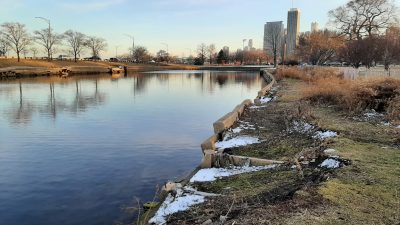Initiative for Resilient Great Lakes Coasts
THE NEED
 Development, pollution, and other human activities have led to a loss of Great Lakes habitat, especially along the coasts. Habitat is crucial for a resilient community and local economy. Healthy ecosystems provide life-sustaining benefits, like clean air and water, to humans and wildlife. Further, habitat features like native plants can attract pollinators, and help with erosion and flood control. The Initiative for Resilient Great Lakes Coasts develops projects that create, connect, restore habitat to protect these processes, and provide new benefits to the community. These projects are designed in partnership with communities to increase their resilience to the coastal challenges they are facing.
Development, pollution, and other human activities have led to a loss of Great Lakes habitat, especially along the coasts. Habitat is crucial for a resilient community and local economy. Healthy ecosystems provide life-sustaining benefits, like clean air and water, to humans and wildlife. Further, habitat features like native plants can attract pollinators, and help with erosion and flood control. The Initiative for Resilient Great Lakes Coasts develops projects that create, connect, restore habitat to protect these processes, and provide new benefits to the community. These projects are designed in partnership with communities to increase their resilience to the coastal challenges they are facing.
THE PROGRAM
The Initiative for Resilient Great Lakes Coasts supports objectives of the Great Lakes Restoration Initiative (GLRI) Focus Area 4: Habitat and Species. The initiative provides training and technical assistance to communities, supporting them through the development and design of habitat-focused projects that improve local community resilience. This is accomplished through the following process:
- Communities join web-based trainings and workshops on habitat restoration and resilience.
- Planning, engineering and habitat experts from partners at Dewberry and LimnoTech provide one-on-one support for project visioning and development.
- Participants submit project ideas to be considered for design and engineering.
- Finalist projects are selected and designed in collaboration with local community representatives.
CURRENT PROJECTS
In summer 2024, over 20 projects were proposed by 14 communities across three states, and 15 were selected for engineering and design support. The following projects are currently receiving assistance. You can request additional information about any of these projects here.
- Oscoda Beach Park Dune Restoration and Stormwater Runoff Project (Oscoda Township, MI)
- East River Flood Solutions on City-Owned Properties – Van Beaver Park (Green Bay, WI)
- Stream Bank Stabilization at Covenant Park (Kentwood, MI)
- Resilient Planning and Design for Barker’s Island Shoreline (Superior, WI)
- Bay City Veterans Memorial Park Shoreline Restoration (Bay City, MI)
- North Shore Coastal Resilience (Duluth, MN)
- Park Point Recreation Area Coastal Resilience (Duluth, MN)
- Coastal Resilience and Green Stormwater Infrastructure at Maslowski Beach (Ashland, WI)
- Lakeside Park Beach Restoration (Rogers City, MI)
- Ecorse Creek Floodplain Restoration at 9th Street and Mill Street (Ecorse, MI)
- BASF Park: Living Coastline (Wyandotte, MI)
- Alpena Water Treatment Plan and Starlite Beach Restoration (Alpena, MI)
SUCCESS STORIES
Since 2021, the initiative has supported more than 50 local entities through training and technical assistance and provided 30-90% engineering and design, maintenance and monitoring plans and construction cost estimates for 12 projects (so far). Please contact us if interested in receiving copies of the project plans. Check out digital renderings of two of these projects below!

The Bayfront East Living Shoreline and Trail Modification Project in Petoskey, Michigan addresses damage to public parkland, sewage infrastructure, and a non-motorized trail caused by fluctuating water levels, wind erosion, and wave overtopping. The design replaces a failing rock revetment with a nature-based, living shoreline by softening the slope, creating a cobble beach and a backshore pond with native plantings and woody debris.

The Lincoln Park South Lagoon Shoreline Resilience Project in Chicago, Illinois addresses severe erosion and infrastructure failure caused by fluctuating lake levels that have overtopped a lagoon wall. The engineered design demonstrates how resilient shoreline solutions can foster ecological benefits and be designed in alignment with the aesthetics of a historic park landscape. The design stabilizes and enhances habitat areas, reduces hardened shorelines, and reconnects the transition zone where the slope can be softened.
Additional Past Projects
- Chapaton Shoreline Restoration and Habitat Enhancements Projects (St. Clair Shores, MI)
- Two Harbors Waterfront Revitalization on Agate Bay (Lake County, MN)
- Bay City Creek Estuary Wetland Restoration and Living Shoreline (Ashland, WI)
- Openlands Lakeshore Preserve Shoreline Protection (Highland Park, IL)
- McCormick Ravine Bluff and Nearshore Habitat Restoration (Lake Forest, IL)
- Lighthouse Beach Shoreline Resilience (Evanston, IL)
- Clark Street Beach Dune Management Plan (Evanston, IL)
- Jackson Park Lagoon Shoreline Restoration (Chicago, IL)
- Bayfront Park West Shoreline Restoration (Petoskey, MI)
- City of Frankford Lake Michigan Coastal Resiliency Project (Frankfort, MI)
- Valley Creek Resiliency Planning – Guenther Pond Restoration (Port Washington, WI)
You can find more snapshots of GLRI funded projects here.
CURRENT OPPORTUNITY
The Initiative for Resilient Great Lakes Coasts is expanding its footprint to include the Lake Erie and Lake Ontario basins (including the Niagara River). Watch the informational webinar that marked the launch of this expansion here.
“Diving into the Digital Coast” and “An Introduction to Nature-Based Solutions for Coastal Hazards” webinar materials are available for view or download via this folder.
Questions? Please check out our Frequently Asked Questions or reach out to Bridget Brown at Bridget.Brown@glslcities.org.

